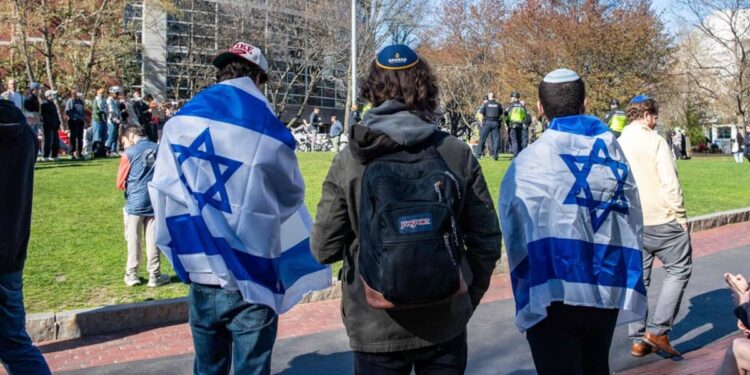In rallies for Gaza on American campuses, many Jewish students actively support the Palestinian cause, keffiyeh on their shoulders. But many other of their co-religionists express their discomfort, and even their fear, in the face of slogans that they consider anti-Semitic.
• Read also: Gaza Support Movement: Columbia University Postpones Campus Evacuation
• Read also: The movement in support of Gaza becomes widespread on American campuses
• Read also: Rising tensions between pro-Palestinian students and police on American campuses
Skyler Sieradzky, 21, studies philosophy and political science at George Washington University (GW) in the capital. She claims that on Thursday, when she arrived with an Israeli flag, she was spat on.
“It’s not just the personal experiences I’ve had, it’s also seeing protests like this and people supporting violence and hatred that scares me,” she told the AFP.
At GW and on the campuses of several of the country’s most prestigious universities, students have organized protests and sit-ins to demand an end to the war in Gaza and for their institutions to break off all collaboration with Israel.
“What I think about this demonstration is that there are direct calls for violence. “From the River to the Sea” is a call for hatred and calls for the eradication of my friends, my family and my person,” Skyler says.
Nervousness
This rallying cry, which refers to the Jordan and the Mediterranean, is one of those which crystallizes tensions the most. It is interpreted by many as a pure and simple call for the destruction of Israel, which is vehemently denied by pro-Palestinian activists, for whom it is a call for the liberation of Palestinians from Israeli occupation. .
The American Democratic representative of Palestinian origin Rashida Tlaib was even censored by the House of Representatives for, among other things, her support for this slogan.
Eli Sanchez, 20, studies at UCLA in Los Angeles and is part of a Jewish student organization. He says he does not feel personally threatened and regularly wears T-shirts with messages in Hebrew, but he reports that on his campus, classmates are afraid to wear a yarmulke.
“A lot of people feel really in danger, a lot of my friends (…), just because they are Jewish,” he says.
“We’ve had people on focus groups asking, ‘Can someone walk next to me when I go to class? I don’t feel safe,'” he says.
“They are so anti-Zionist and so anti-Israel that they also tend to be anti-Semitic and anti-Jewish,” he said of the pro-Palestinian protesters.
At Columbia University in New York, the epicenter of the latest wave of student mobilization for Gaza, Noah Letterman expresses his nervousness.
“Honestly, I don’t feel safe,” he said. “I think the university has failed to protect its Jewish community.”
Uncomfortable or unsafe
But other Jewish students are keen to make a different point of view.
“It’s very important to remember that being uncomfortable is different from being in danger,” Soph Askanase, who said she was suspended by Columbia for her pro-Palestinian activism hours before being suspended, told reporters. being arrested by the police.
“I sympathize with people who feel uncomfortable with certain speech, but I remind you that we (…) study at a university that places great importance on freedom of expression,” he said. -she adds.
The latest student demonstrations have revived the already heated, even violent, debate on freedom of expression.
Images of riot police arresting hundreds of students on campus, after being called to the rescue by university leaders, have gone around the world, recalling similar events in the United States during the war from Vietnam.
Amid these tensions, USC University in Los Angeles, where around a hundred people were arrested this week, announced the cancellation of its main graduation ceremony this year, officially due to “new security measures “.



